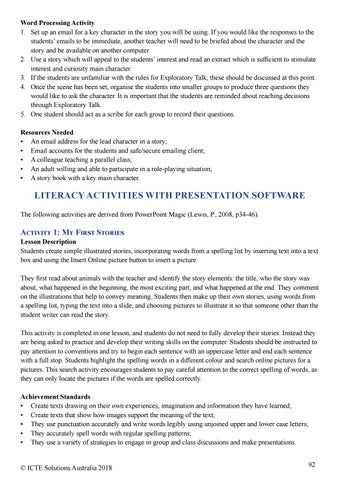Word Processing Activity 1. Set up an email for a key character in the story you will be using. If you would like the responses to the students’ emails to be immediate, another teacher will need to be briefed about the character and the story and be available on another computer. 2. Use a story which will appeal to the students’ interest and read an extract which is sufficient to stimulate interest and curiosity main character. 3. If the students are unfamiliar with the rules for Exploratory Talk, these should be discussed at this point. 4. Once the scene has been set, organise the students into smaller groups to produce three questions they would like to ask the character. It is important that the students are reminded about reaching decisions through Exploratory Talk. 5. One student should act as a scribe for each group to record their questions. Resources Needed • An email address for the lead character in a story; • Email accounts for the students and safe/secure emailing client; • A colleague teaching a parallel class; • An adult willing and able to participate in a role-playing situation; • A story book with a key main character.
LITERACY ACTIVITIES WITH PRESENTATION SOFTWARE The following activities are derived from PowerPoint Magic (Lewis, P., 2008, p34-46).
Activity 1: My First Stories
Lesson Description Students create simple illustrated stories, incorporating words from a spelling list by inserting text into a text box and using the Insert Online picture button to insert a picture. They first read about animals with the teacher and identify the story elements: the title, who the story was about, what happened in the beginning, the most exciting part, and what happened at the end. They comment on the illustrations that help to convey meaning. Students then make up their own stories, using words from a spelling list, typing the text into a slide, and choosing pictures to illustrate it so that someone other than the student writer can read the story. This activity is completed in one lesson, and students do not need to fully develop their stories. Instead they are being asked to practice and develop their writing skills on the computer. Students should be instructed to pay attention to conventions and try to begin each sentence with an uppercase letter and end each sentence with a full stop. Students highlight the spelling words in a different colour and search online pictures for a pictures. This search activity encourages students to pay careful attention to the correct spelling of words, as they can only locate the pictures if the words are spelled correctly. Achievement Standards • Create texts drawing on their own experiences, imagination and information they have learned; • Create texts that show how images support the meaning of the text; • They use punctuation accurately and write words legibly using unjoined upper and lower case letters; • They accurately spell words with regular spelling patterns; • They use a variety of strategies to engage in group and class discussions and make presentations. © ICTE Solutions Australia 2018
92


